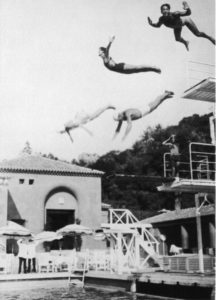(PSSSSST! BE SURE TO SCROLL TO THE BOTTOM OF TODAY”S POST! I HAVE TO ASK YOU SOMETHING!)
One of the differences (for me) between an early and a late draft is that as I revise, I trim or cut the opening chapters. I have a bad habit of frontloading too much information in early drafts. I see this when I do manuscript critiques, too. The author goes on a long-winded explanation of the culture of the world where the story is set, or they give every detail about the night the main character’s grandparents met, etc. These chapters have a great deal of “telling,” usually in the narrator’s omniscient voice, and not much in the way of “showing,” i.e. action or dialog.
If you are feeling a little guilty after reading the paragraph above, knock it off. This doesn’t mean you’re a bad writer. It means you’re still arm-wrestling an early draft.
But at some point, you need to take a deep breath, cut out all the fluff, and dive in to your story.
We shove all that background stuff into the front of the book where it doesn’t belong, because WE, that is, the author, are still figuring out the world of the story. The trick is once you’ve figured out all the background and the situations that led up to your opening dramatic scene, to cut out most or all of it. (The Latin for this is in media res.) You’ll find ways to subtly weave in the information as the story unfolds. If you absolutely, positively cannot bring yourself to cut out the four pages of chapter one in which you explain why all the characters have one foot, and the etiquette of how a left-foot person asks a right-foot person to dance, and the overthrow of the government that was the direct result of the covert importation of the first sneakers ever seen in this distant land, then I have news for you.
You might want to find a different opening scene, one that is so compelling, you don’t drown your reader in backstory.
Ready… Clear your throat. For real. You sound like you’re coming down with something. Do you want a lemon drop?
Set… “Finally, I try to work slow. I plod, double-check, and triple-check and then check a couple more times. If I go slow enough, I can hopefully craft something that the reader will fly through in a straight rush. That’s the goal, anyway.” Joe Hill
Today’s prompt: Write “Once upon a time,” and then complete the sentence. BUT! Make it an action-packed sentence. No background. No explanation. All showing, no telling. Make it the kind of sentence that will put your reader on the edge of his seat and beg you for the rest of the story. See if you can write at least fifteen of these sentences in the next fifteen minutes.
Scribble… Scribble… Scribble…
WAIT!! DON’T START WRITING YET! I HAVE A QUESTION!
Thank you.
The 4th Annual WFMAD Challenge is almost over. What would you like me to discuss in the days we have left? Any burning questions? Pet peeves? Ponderous problems? Tell me all about them and I’ll see what I can do to help.
OK. Now go do that scribble thing.

